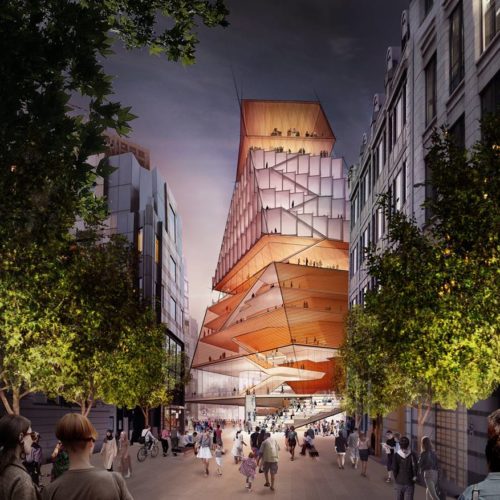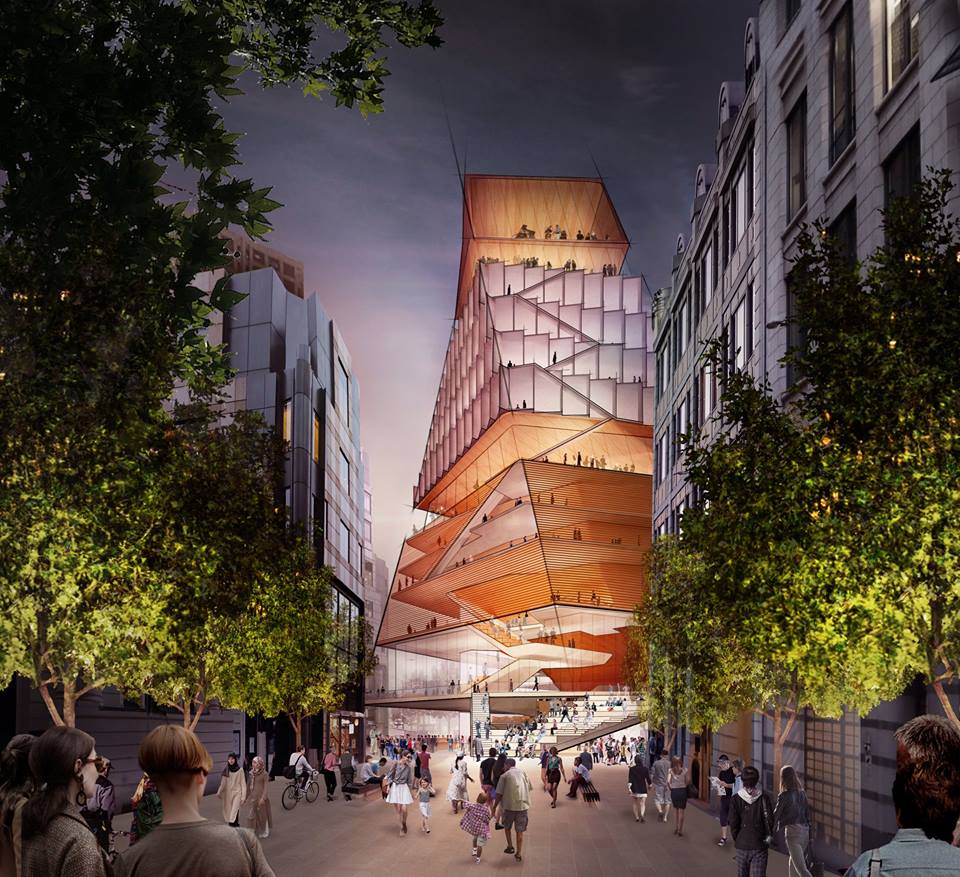A new London concert hall would be perverse
mainPhineas Harper, chief curator of the Oslo Triennale, has written a powerful blast against Sir Simon’s Rattle’s demand for a half-billion concert hall just a few hundred yards away from the present facility.
He says: ‘To build a concert hall, on the steps of another in order to gain adjustments in resonance so slight that they are imperceptible to the vast majority of ordinary people is beyond fussiness – it is perverse.’
And: How have our urban priorities become so warped that fire stations, court houses, hospitals, women’s refuges and community centres close down every week, while classical conductors can demand new orchestral venues be built neighbouring existing ones on such marginal aesthetic grounds?
Read on here.







Yet another next to useless vanity project . If Rattle wants it so much , let him put his money where his mouth is
It wouldn’t be perverse, if it would embody a substantial improvement in acoustics and general architectural excellence of a temple of music that withstands the fashions of the day for a long time to come.
But what we have seen of the concept so far, it will be just an acoustically mediocre to insufficient vanity temple to another big name conductor, who wants a hall built for himself, where he is in the center of attention and surrounded by audience, regardless of how well they can hear the orchestra and soloists.
Perversion indeed.
Interestingly the best halls that stood the test of time (Musikverein, Concertgebouw, Boston Symphony Hall etc.) were built by and for the enlightened audience, not by and for conductors.
Yeah, Rattle should learn from the example of Symphony Hall…er…
Doesn’t it say it all you can’t mention one decent orchestral concert hall in London? So get real we need one; RAH, RFH & Barbican are NBG!
You might need one, but not this one. Hamburg Elbphilhamornie… the biggest goosebump killer in classical music, big money has ever built. The best hall ever, to hear Aunt Sally open her purse and unwrapping a cough drops ever.
Do people ever learn?
But we have more than decent music and a different concert everywhere every night in London. We don’t get the same over rehearsed programme in any part of Britain that is the same.
If you want examples of “vanity projects”, I suggest you give some thought to the number of buildings that the EU seems to think it needs in Brussels and elsewhere.
I’m sure that some of these could be converted into hospitals or used by the homeless, if that’s what genuinely matters, without the EU’s functions grinding to a halt.
“Adjustments in resonance so slight?” “Subtle flaws?” The Barbican Hall’s problems are far greater than that, or so critics have been telling us ever since it was built. I believe NL himself has used the word “dismal”.
“If London is so desperate to cast itself as enjoying the best architectural conditions in Europe, why not channel that hubristic energy into boasting the lowest number of rough sleepers, or the cleanest air?”
Why is it only concert halls which, in some mysterious way, seem to deprive rough sleepers of accommodation? And are hospitals really closing down “every week”? Why not unnecessary new office buildings, many in the public sector, just for starters?
A nauseating example of misinformation and virtue signalling.
“He says: ‘To build a concert hall, on the steps of another in order to gain adjustments in resonance so slight that they are imperceptible to the vast majority of ordinary people is beyond fussiness – it is perverse.’
And: How have our urban priorities become so warped that fire stations, court houses, hospitals, women’s refuges and community centres close down every week, while classical conductors can demand new orchestral venues be built neighbouring existing ones on such marginal aesthetic grounds?”
I disagree with this. The human spirit just needs as much priority and public support and money, as the fundamental physical needs of humanity do. It’s what pulls us upward.
We need both, secure fundament and aspirational top. To argue one against the other is a fallacy.
How poor would our world and cultural heritage look like, had we only catered to the priority of the fundamental physiological and security needs of humans and not also the higher aspirations.
Ridiculous commentary, ridiculous post
Don’t forget that, in the Barbican, approximately 15-20% of the core repertoire is either totally unplayable, or utterly unsatisfactory, as a result of the small size of the stage (and therefore a lack of space for the orchestral sound to ‘breathe’) and there is also no pipe organ (you have to bring in an electronic one). You cannot, to take some extreme examples, perform Mahler 8 or Gurrelieder there.
But equally, in terms of sound, works like Shostakovich 4, Rite of Spring, Mahler 3, and many Bruckner Symphonies, just sound congested in there, as there is not enough air space around the musicians for the sound to resonate properly (regardless of the general acoustic issues in there).
Don’t disagree with much of this, but let’s remember that at this stage this is very much a pipe dream. It’s entirely unfunded, and at this point I can’t see any path to how it might get funded anytime soon. It might end up like the BBC Music Box. Remember *that*? Here:
http://www.bbc.co.uk/pressoffice/pressreleases/stories/2003/11_november/17/music_centre_architects.shtml
https://arcspace.com/feature/the-music-box-bbc/
https://www.designbuild-network.com/projects/bbc-music-centre/
Let’s edit it slightly, shall we?
To [hire a world-class conductor] to gain adjustments in [interpretation] so slight that they are imperceptible to the vast majority of ordinary people is beyond fussiness – it is perverse
It’s the nature of art music that most changes are “imperceptible to the vast majority of ordinary people”….
Some guaranteed memorable performances from Sir Rattle would be nice. But then again, he cannot possibly conduct Mahler 2nd every night for the whole season.
🙂
In a nutshell, who cares. Case study #1:
Acoustics at Carnegie and Avery Fisher (sorry again, Mr Geffen!) are average. They do not take away all those life-time memorable performances since their opening, however.
Acoustics @ Carnegie are very much above average!
Better a new concert hall than what we do in the US. We have no money whatsoever to maintain or build public schools, concert halls or any other facilities that serve the public, save for one: sports facilities. For that, we have unlimited funds, we gladly plunge ourselves into debt and raise taxes, we regularly tear down perfectly adequate facilities less than 30 years old or bulldoze entire neighborhoods to build new ones, no expense or person spared.
Rededicating 1% of your insane war/military budget into cultural subsidies would get public cultural funding in the US a long way.
1% would be 8 billion US $ (that’s only official without the grey and black budgets)
How many times does it need to be made clear that Rattle did not DEMAND a new hall before people actually get it into their heads?
Ridiculous when the Barbican is quite adequate. There just isn’t the money for such projects unless a billionaire wants to chip in.
Why not have all of the above? Capital projects are long-lasting investments that prove their worth over time. With an abundance of mediocre auditoria in London, you’d think this would be welcomed. The ‘either one or the other’ argument just doesn’t stand up. Not building this hall won’t cause all the closed fire stations, libraries, women’s shelters, etc. to suddenly be funded again.
The writer asks why London can’t boast the cleanest air. Progress on that front has been pretty spectacular, actually: https://ourworldindata.org/grapher/air-pollutant-emissions?time=1970..2016
Who is going to attend all these marvellous concerts in the future if the government’s continuing attack on music education in our schools continues? Maybe the corporate dosh that will be lavished on this smart new concert hall would be better spent on subsidising music tuition in our schools. Just a thought …..
==better spent on subsidising music tuition in our schools
Yes, Nigel Kennedy said as much in a recent interview.
Average people may not be able to describe the difference in a blind test, but it has EVERYTHING to do with how memorable an experience they’ll have when they come to a concert.
A good hall can make the difference between a first-time concert goer’s experience being either magical or humdrum. That’s what Rattle is getting at.
Rather pretentious styling, but an old saw: How can we send a man to the moon when there are so many unmet needs at home? Hall or not, we will never have all needs met.
I have never understood Sir Simon’s advocacy for a new hall to be a “demand” or a vanity project – indeed it would probably not be built during his likely LSO tenure – but an effort to lend his influential voice to the cause of getting the great city have a world-class hall, which few seem to dispute London currently lacks.
London can’t afford it? London is one of the richest cities in the world. Maybe a couple Russian oligarchs and Saudi sheiks could front some pounds. Deripaska Hall, anyone?
A new concert hall, provided it is striking in design and successful in acoustics, could revitalise classical music in London. The musical life of Hamburg have been transformed by the new hall. I believe Paris also benefited from its new hall. None of the big halls in London are particularly appealing & the musical scene there most certainly requires some revitalisation.
I fail to understand why any new concert hall has to be either stand alone or as part of a smallish office building. Unless there is a donor prepared to seed a huge amount of cash, London will never have an architectural icon building like the Walt Disney Concert Hall. So why not take a leaf out of Tokyo’s book?
The long established Bunkamura complex with its large concert hall (shoe-box shape), Theatre Cocoon and excellent small art gallery – I once saw a stunning Monet/Renoir exhibition there – along with restaurants, cafes and dedicated arts-related retail outlets is part of a large Department Store in the Shibuya District. No, you don’t have to go through the underwear department to reach it. The arts facilities have separate entrances.
The Bunkamura is low-rise. Tokyo Opera City is a 54-storey office tower. On its lower floors it houses the Tokyo National Theatre, the acoustically superb Takemitsu Concert Hall (shoe-box shape), a recital hall and art gallery, along with similar dedicated retail outlets and dozens of different types of eateries.
Neither building is of any exterior architectural significance and each requires most arts patrons to walk a few hundred meters to reach them. I have no idea how they were financed. The point of mentioning them is merely to ask why such a solution can not be ideal for London, with the private sector covering the costs of the building and the public sector those specific costs for the concert hall. There is a cross-fertilisation that clearly works well in the Tokyo buildings. Why must concerts and the arts in general take place in their own ivory towers?
Calm down Norman, it’s all getting a bit Samey (and irrelevant)
Shiny new concert halls have the habit of being hideously expensive to hire and run (far more expensive than the halls they replace), the result being that few/no orchestras can avail themselves thereof, and, when they do, only for the ‘blockbuster’ concerts, and then only for the dress rehearsal and the concert itself. As a result, such halls end up having an unadventurous artistic programme propped-up by pop, crossover, and commercial hires. Ultimately, the proposed concert hall will end up being little more than a tax-efficient way to build a new conference centre for the City of London.
Shabby acoustics are a price worth paying for having halls that are affordable to hire and run, and thus facilitate an artistic programme drawing on the incredible breadth of the London orchestral scene.
Rather than lining the pockets of starchitects AGAIN, how about funding the people who actually make the music.